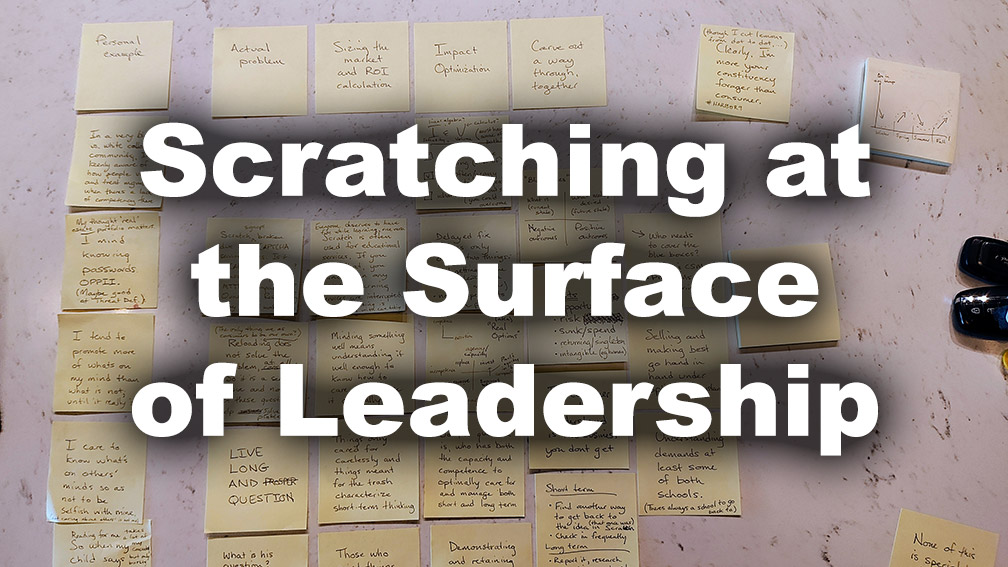‘Scratching’ at the Surface of Leadership

Already in this new leg of my journey, I have a lot of thoughts about what kind of teams and leadership I’d like to be part of. To illustrate, I’d like to share a story of something recently experienced.
I live in a very blue vs. white collar community, so I’m keenly aware of how people view and treat management (captains, bosses, supervisors, executives, etc.) and how jarring it is to them when there’s a lack of competency about their domain of work in those who manage them.
Thought Real Estate
For myself, managing my ‘thought real estate’ is important; what I spend time caring about with my mind and my time matters. A specific point I regularly care about is that I mind knowing passwords, and I tend not to want to at all. Passwords (a.k.a. ‘secrets’) are OPPII, Other Peoples’ Personally Identifiable Information, and none of my business (except for my own, which itself is problematic).
Like you, I tend to promote and explore what is on my (top of) mind more than things which aren’t. Over time, things change and I shuffle what’s on my mind purposely. I do this by caring about what’s on others’ minds, otherwise it becomes a selfish echo chamber that doesn’t help others, which is big for me. I also conume a ton of input from other sources…audiobooks, especially, but also reading books, conversations, podcasts, youtube presentations, online articles, everything and anything, from all poles to have a good sample size. But reading a book at home takes a lot out of me cognitively.
“NOT MY PII!!!”
So when my child unwittingly interjects by saying the words “NOT MY PII” while using Scratch on the Chromebook, what’s on their mind is on my mind instantly. Being a parent is a full-time job where being interruptable is a basic functional requirement. We were both on couches working on something fun for us on the weekend.
So I stop and ask if I can help, only to find that the Scratch signup process is broken due to reCAPTCHA services being ‘unavailable’. Immediately, I think:
- is it a reCAPTCHA or Scratch issue?
- how consistently and frequently is the issue happening?
- what is the Mean Time to Resolution (MTTR) and what impact does it have on other services?
- who owns the problem and what responsibilities to resolve are spread where?
(This is my brain at work, not at home, and I realize that immediately, so I back off and think what can we do about it immediately. Having your weekend fun abruptly cut off is no fun for a kid, but there are always other outlets.)
What can we do as consumers? Well, reloading doesn’t solve the problem, over a matter of 15 minutes. So it is a service issue and none of the privately held questions above solves my child’s problems.
Live Long and Question
I have been working in tech since I was 15 years old, so naturally my knee-jerk reactive questions are not even close to my kid’s. From their perspective, questions that don’t help are:
- what is reCAPTCHA?
- how do cloud services work?
- what else can we do?
- who can we send these troubleshooting steps and screenshots to?
They are:
People (little or big) who don’t have decades of experience with life and practice on the patience front just want to get back to what works to solve their problem at hand.
(This is why I really like who I’m currently interviewing.)
Everyone Deserves to Have Some Fun
While learning (and vice-versa), fun is a positive reinforcement mechanism. Not ignoring Maslow on that, the point is that all children (globally) deserve an education that includes fun, not just ‘fundamental’(ism).
Bringing it back to localhost: Scratch is widely used by schools in the United States of America, supposedly to have fun. For more on the importance of fun in early childhood development, please refer to the prior paragraph and all other post-industrial research insights. If you mind that, you mind when ANY child’s learning services are interrupted by (level) service interruption.
In this context, minding something is synonymous with care (taking) for it. Not always are they, especially when it’s someone else’s job (invoking function) and it would be an overstep. However, over public services while there are elected/named arbiters, it is everyone’s responsibility to protect and increase investment in the next generation.
Management Optima
Minding something well means understanding it well enough to know how to care and manage it optimally.
Things managed carelessly and thus meant for the trash are characterized by short-term and incomplete thinking.
Thus it follows that those who mind things well think about both short and long term optima. Not either/or, both/and, in everything.
Scratch Deserves Optimal Management
Learning requires fun. Both learning and fun come in stages over time. It takes time to understand the role management plays. Not unlike all organizations, public services and education deserve the very best of all GDPs. Optimal management is defined by how many constituents thrive because of it, not by how much money is made by any particular individual (particularly those in management). People who hoar(d) authority telegraph their opposing viewpoint to this.
Intent, bandwidth, and timeliness define every business. Scratch seems to only be lacking bandwidth. Having been an MIT fantasizer in the 90s and a Boston-area community organizer, I still hesitate to assume that I can help them, but I hope that they find deserving and compelled resources to prevent them from more downtime or obvious functional outages.
The question is: who has both the capacity and competence to optimally care for and manage both short and long term…learning fun.
Demonstrating and retaining these responsibilities is the defining material of leadership.